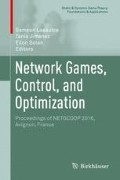Abstract
We propose an incentive mechanism for steering the strategies of noncooperative heterogeneous agents, each with strongly convex cost function depending on the average among the agents’ strategies, and all sharing a convex constraint, toward a competitive aggregative equilibrium. We consider a coordinator agent having access to the average among the agents’ strategies and broadcasting incentive signals that affect the decentralized optimal responses of the agents. Our mechanism ensures, based on the Picard–Banach fixed point iteration, global convergence to an equilibrium.
Access this chapter
Tax calculation will be finalised at checkout
Purchases are for personal use only
References
J. Barrera and A. Garcia. Dynamic incentives for congestion control. IEEE Trans. on Automatic Control, 60(2):299–310, 2015.
H. H. Bauschke and P. L. Combettes. Convex analysis and monotone operator theory in Hilbert spaces. Springer, 2010.
H. H. Bauschke, V. Martín-Márquez, S. M. Moffat, and X. Wang. Compositions and convex combinations of asymptotically regular firmly nonexpansive mappings are also asymptotically regular. Fixed Point Theory and Applications, 53:1–11, 2012.
P. Combettes. Fejér monotonicity in convex optimization. In Encyclopedia of Optimization. Springer, 2000.
Andres Cortés and Sonia Martínez. Self-triggered best-response dynamics for continuous games. IEEE Trans. on Automatic Control, 60(4):1115–1120, 2015.
P. Dubey, O. Haimanko, and A. Zapechelnyuk. Strategic complements and substitutes, and potential games. Games and Economic Behavior, 54:77–94, 2006.
F. Facchinei and C. Kanzow. Generalized Nash equilibrium problems. A Quarterly Journal of Operations Research, Springer, 5:173–210, 2007.
F. Facchinei and J.S. Pang. Finite-dimensional variational inequalities and complementarity problems. Springer Verlag, 2003.
S. Grammatico. Aggregative control of competitive agents with coupled quadratic costs and shared constraints. In Proc. of the IEEE Conf. on Decision and Control, Las Vegas, USA, 2016.
S. Grammatico. Aggregative control of large populations of noncooperative agents. In Proc. of the IEEE Conf. on Decision and Control, Las Vegas, USA, 2016.
S. Grammatico. Dynamic control of agents playing aggregative games. IEEE Trans. on Automatic Control (submitted, https://arxiv.org/pdf/1609.08962.pdf), 2016.
S. Grammatico. Exponentially convergent decentralized charging control for large populations of plug-in electric vehicles. In Proc. of the IEEE Conf. on Decision and Control, Las Vegas, USA, 2016.
S. Grammatico, B. Gentile, F. Parise, and J. Lygeros. A mean field control approach for demand side management of large populations of thermostatically controlled loads. In Proc. of the IEEE European Control Conference, Linz, Austria, 2015.
S. Grammatico, F. Parise, M. Colombino, and J. Lygeros. Decentralized convergence to Nash equilibria in constrained deterministic mean field control. IEEE Trans. on Automatic Control, http://dx.doi.org/10.1109/TAC.2015.2513368, 2016.
S. Grammatico, F. Parise, and J. Lygeros. Constrained linear quadratic deterministic mean field control: Decentralized convergence to Nash equilibria in large populations of heterogeneous agents. Proc. of the IEEE Conf. on Decision and Control, pages 4412–4417, 2015.
J. S. Shamma and G. Arslan. Dynamic fictitious play, dynamic gradient play, and distributed convergence to nash equilibria. IEEE Trans. on Automatic Control, 50(3):312–327, 2005.
J. Koshal, A. Nedić, and U. Shanbhag. Distributed algorithms for aggregative games on graphs. Operations Research, 64(3):680–704, 2016.
N. S. Kukushkin. Best response dynamics in finite games with additive aggregation. Games and Economic Behavior, 48(1):94–10, 2004.
A. A. Kulkarni and U. Shanbhag. On the variational equilibrium as a refinement of the generalized Nash equilibrium. Automatica, 48:45–55, 2012.
N. Li, L. Chen, and M. A. Dahleh. Demand response using linear supply function bidding. IEEE Trans. on Smart Grid, 6(4):1827–1838, 2015.
S. Li, W. Zhang, J. Lian, and K. Kalsi. Market-based coordination of thermostatically controlled loads - Part I: A mechanism design formulation. IEEE Trans. on Power Systems, 31(2):1170–1178, 2016.
Z. Ma, D.S. Callaway, and I.A. Hiskens. Decentralized charging control of large populations of plug-in electric vehicles. IEEE Trans. on Control Systems Technology, 21(1):67–78, 2013.
Z. Ma, S. Zou, L. Ran, X. Shi, and I. Hiskens. Efficient decentralized coordination of large-scale plug-in electric vehicle charging. Automatica, 69:35–47, 2016.
J.R. Marden, G. Arslan, and J.S. Shamma. Joint strategy fictitious play with inertia for potential games. IEEE Trans. on Automatic Control, 54(2):208–220, 2009.
A.-H. Mohsenian-Rad, V.W.S. Wong, J. Jatskevich, R. Schober, and A. Leon-Garcia. Autonomous demand-side management based on game-theoretic energy consumption scheduling for the future smart grid. IEEE Trans. on Smart Grid, 1(3):320–331, 2010.
F. Parise, M. Colombino, S. Grammatico, and J. Lygeros. Mean field constrained charging policy for large populations of plug-in electric vehicles. In Proc. of the IEEE Conference on Decision and Control, pages 5101–5106, Los Angeles, California, USA, 2014.
F. Parise, B. Gentile, S. Grammatico, and J. Lygeros. Network aggregative games: Distributed convergence to Nash equilibria. In Proc. of the IEEE Conference on Decision and Control, pages 2295–2300, Osaka, Japan, 2015.
L. Pavel. An extension of duality to a game-theoretic framework. Automatica, 43:226–237, 2007.
J.B. Rosen. Existence and uniqueness of equilibrium points for concave n-person games. Econometrica, 33:520–534, 1965.
R.T. Rockafellar and R.J.B. Wets. Variational Analysis. Springer, 1998.
W. Saad, Z. Han, H.V. Poor, and T. Başar. Game theoretic methods for the smart grid. IEEE Signal Processing Magazine, pages 86–105, 2012.
S. Uryasev and R.Y. Rubinstein. On relaxation algorithms in computation of non-cooperative equilibria. IEEE Trans. on Automatic Control, 39(6):1263–1267, 1994.
H. Yin, U.V. Shanbhag, and P.G. Mehta. Nash equilibrium problems with scaled congestion costs and shared constraints. IEEE Trans. on Automatic Control, 56(7):1702–1708, 2011.
M. Zhu and E. Frazzoli. Distributed robust adaptive equilibrium computation for generalized convex games. Automatica, 63:82–91, 2016.
Author information
Authors and Affiliations
Corresponding author
Editor information
Editors and Affiliations
Rights and permissions
Copyright information
© 2017 Springer International Publishing AG
About this paper
Cite this paper
Grammatico, S. (2017). An Incentive Mechanism for Agents Playing Competitive Aggregative Games. In: Lasaulce, S., Jimenez, T., Solan, E. (eds) Network Games, Control, and Optimization. NETGCOOP 2016. Static & Dynamic Game Theory: Foundations & Applications. Birkhäuser, Cham. https://doi.org/10.1007/978-3-319-51034-7_11
Download citation
DOI: https://doi.org/10.1007/978-3-319-51034-7_11
Published:
Publisher Name: Birkhäuser, Cham
Print ISBN: 978-3-319-51033-0
Online ISBN: 978-3-319-51034-7
eBook Packages: Mathematics and StatisticsMathematics and Statistics (R0)

